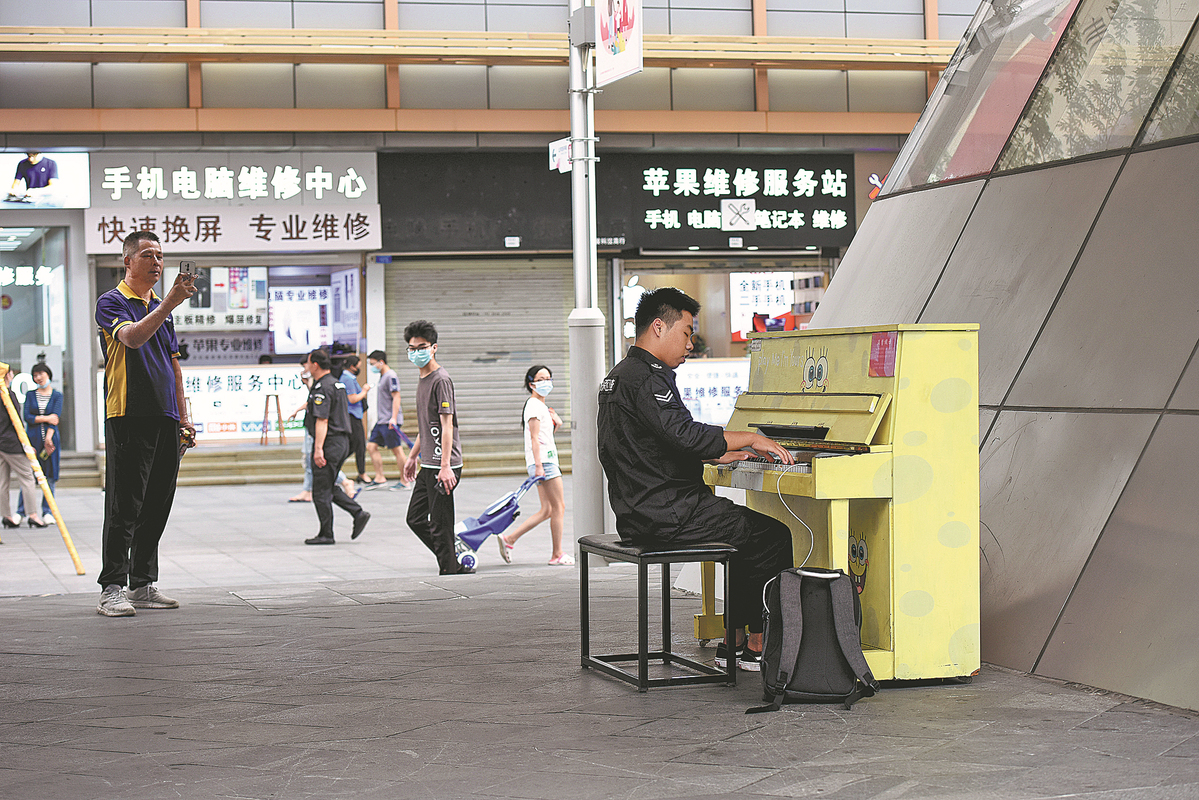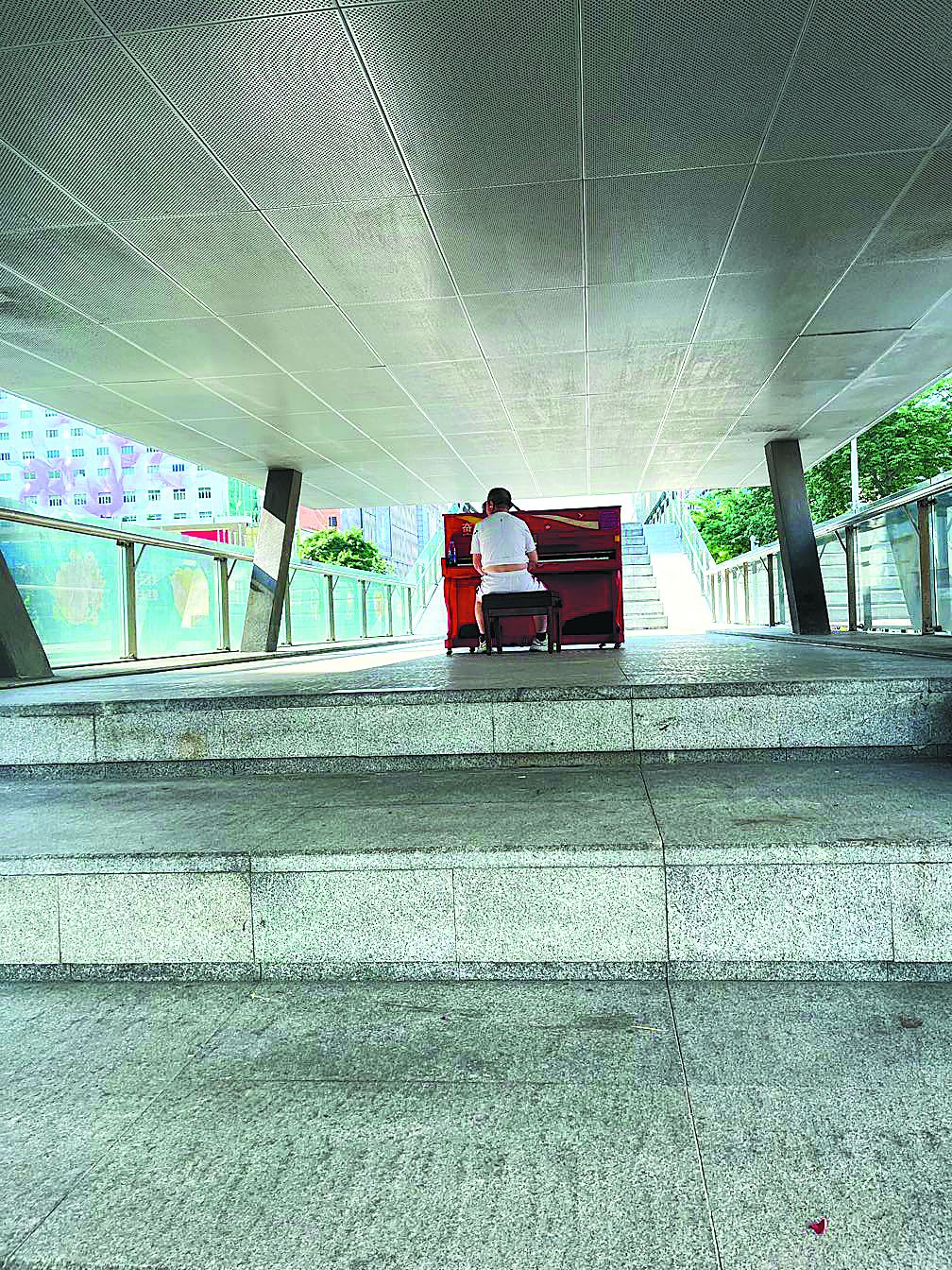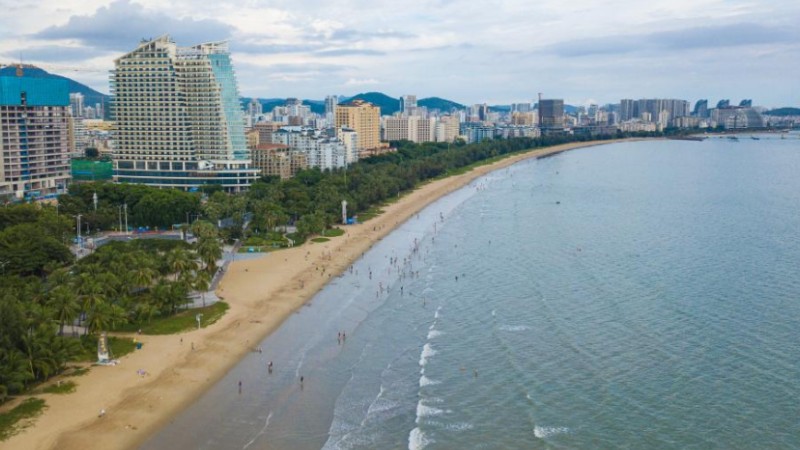Shenzhen gets in tune with cultural ambitions

A security guard plays pianos placed under escalators in Huaqiangbei. YI YANG/FOR CHINA DAILY
Street piano initiative attracts players from many walks of life
Yi Qunlin looked nothing like a musician when he pounded the keys of a grand piano at a newly built concert hall in Shenzhen, Guangdong province, in May.
The 57-year-old forsook traditional concert attire of evening wear, opting instead to perform in a reflective safety vest and helmet.
Despite his unconventional appearance, he gave a masterly performance at the piano keyboard, and has since become an internet sensation.
Wu Bing, a member of the audience that day, said: "I was simply blown away by how proficient he is. He is brilliant."
Yi, the first person to perform in the new concert hall at the Cultural and Art Center in Guangming district, Shenzhen, could never have imagined that one day he would play the piano at a venue he helped build as a construction worker.
"Playing the piano in a concert hall is like a teenage dream come true," Yi said.
His interest was triggered when pianos were placed for the public to play near subway entrances in Shenzhen's Huaqiangbei, one of the world's largest electronics markets. The instruments were positioned on a street more than 900 meters long.

Yi Qunlin performs at a concert hall in Shenzhen in May. CHINA DAILY
In April, video footage of Yi playing a piano in Huaqiangbei clad in a helmet and reflective vest went viral online, quickly trending on Sina Weibo and X, formerly known as Twitter.
By early last month, the footage had been viewed at least 4 million times worldwide, with attention focusing not only on Yi, but also on the determination of the authorities in Shenzhen for the city to embrace a culture characterized by "openness and inclusiveness".
Born in an obscure village in Huarong county, Hunan province, Yi had few opportunities to play instruments when he was young. Yet, the self-taught performer eagerly accepted any opportunity to learn and practice, as he was captivated by musical composition.
At the age of 6, when most performers have already begun studying the piano at music academies, Yi learned the traditional stringed instrument the erhu from a group of people lodging at his home. It was not until much later that he first saw a piano when he visited his cousin's house in Huarong.
"My family was too poor to buy a piano for me, so I often used to visit my cousin, even though it took about an hour to travel the 20 kilometers to his home over bumpy roads just for the opportunity to sit at the keyboard," Yi said.

Piano is played on a street in Huaqiangbei, Shenzhen, Guangdong province. YI YANG/FOR CHINA DAILY
Fresh start
Yi first arrived in Shenzhen 19 years ago and worked in factories, on construction sites and in kitchens, while teaching himself to play instruments such as the harmonica, flute and saxophone in his spare time. He had not played a piano for nearly 30 years.
The public pianos in Huaqiangbei offered him a fresh start.
On a hot summer's day, while taking a break from work at a nearby construction site, Yi and his son passed one of the instruments. Encouraged by his son, Yi decided to give it a try.
Feeling a little awkward at first, he rubbed his hands nervously on his clothes, but the moment he placed his fingers on the keys, his confidence returned.
"It was like chatting with an old friend. It had been a long time since my last piano practice. I was so excited, that my heart was still beating rapidly when I returned home," Yi said.
Although his success quickly made him an online sensation in China and overseas, Yi is not the only one to benefit from the pianos in Huaqiangbei.
Inspired by the British artist Luke Jerram, who has placed more than 2,000 street pianos in over 70 cities worldwide since 2008 with the words "Play Me, I'm Yours" printed on their sides, the public piano project in Huaqiangbei was launched by the local government in 2018.
Zhang Chen, deputy director of the Huaqiangbei subdistrict office, said: "Huaqiangbei is located in the commercial district in the center of Shenzhen. We have been trying to provide diverse facilities to bring high-quality public cultural services to the area. We are surprised that the public piano project has attracted so many people to play the instruments, and others to watch them perform."
The project is also part of a bigger plan in Shenzhen to build a city culture characterized by openness and inclusiveness, which are the expectations of President Xi Jinping, Zhang said.

A woman plays pianos placed under escalators in Huaqiangbei. YI YANG/FOR CHINA DAILY
In June, Xi sent a congratulatory letter to the first Forum on Building up China's Cultural Strength, which was held in Shenzhen.
He wrote in the letter that the Communist Party of China is committed to securing new successes in developing socialist culture.
"We must fully implement the Thought on Socialism with Chinese Characteristics for a New Era and the guiding principles of the 20th CPC National Congress, better shoulder new cultural missions, increase confidence in our own culture, adhere to the approach of openness and inclusiveness, uphold fundamental principles and break new ground, and inspire the cultural creativity of the whole nation," Xi wrote.
Zhang said the choice of Shenzhen to host the forum showed that the central government expects the city to take the lead in promoting cultural prosperity, adding that he was impressed by the emphasis placed by Xi on openness and inclusiveness.
"As grassroots civil servants, we will keep in mind the important instructions in Xi's congratulatory letter and work hard to deliver a vibrant, dynamic and thriving community that celebrates diversity, fosters social cohesion, and drives economic and cultural growth," Zhang added.

Piano is played in a subway station in Huaqiangbei, Shenzhen, Guangdong province. YI YANG/FOR CHINA DAILY
Group launched
Eight public pianos have been positioned in Huaqiangbei, and in addition to students, they are played by people in a wide range of jobs on their way home from work.
Some people come to Huaqiangbei to play the instruments, as they don't have a piano at home, while others feel they can perform in the area without any constraints.
When Lu Xuefeng, a 50-year-old housewife, discovered the public pianos, she visited the area every night to play them. She said she could "contribute what she has left" by playing in Huaqiangbei.
Lu decided to launch a WeChat group, "Romantic Piano Night in Huaqiangbei," which now has about 350 members. The group acts as a community where piano enthusiasts from different places come together to organize gatherings and other events.
Starting with just 20 people, the group once had as many as 400 members. It enables members to connect with each other, share their progress in practicing the piano, discuss challenges they face, and plan pieces to perform at gatherings.
Lu said, "Playing the piano on the street brings back memories of my youth," adding that it also provides the elderly with the chance to connect with the younger generation and become part of the vibrant city life in Shenzhen.
Hua Jian, a professor at the Shanghai Academy of Social Sciences, said it is important to cultivate individuals through culture.
He added that culture plays a fundamental role in shaping people's inner spiritual strength, inspires a forward-looking vitality in the city, provides a benchmark for its future direction, fuels innovative energy in urban development, and fosters broad cultural exchanges among people.
Hua said the Guidelines of the CPC Central Committee and the State Council on Supporting Shenzhen in Building a Pilot Demonstration Area of Socialism with Chinese Characteristics put forward five strategic positions for the city to create a model for a modern socialist country, one of which is an urban civilization model.
"Under the guidelines, Shenzhen should leave a distinct mark on urban civilization in terms of cultural significance, industry, services, communication, and trade," Hua said.
"It is vital for the city to understand and harness its appeal, creativity, productivity, service capabilities and cultural influence to take the lead in shaping a modern urban civilization that showcases the prosperity of socialist culture."
He suggested that Shenzhen give priority to strengthening good cultural governance to create an open and inclusive environment that promotes a better life for residents.
"It is crucial to ensure that all residents can enjoy the benefits of urban civilization and have access to a diverse cultural experience in Shenzhen," Hua said.
"By fostering a rich and vibrant cultural landscape and an inclusive and welcoming atmosphere, the city can enhance residents' quality of life."
Hua also emphasized the importance of improving cultural infrastructure and organizing a wide range of cultural activities to meet residents' diverse needs.
Ye Ziyu, Liu Yangjiadi, Yan Xinyi and Wu Baorong contributed to this story.
Photos
Related Stories
- Firms listed on Shenzhen bourse report revenue, profit growth in Q2
- Most severe emergency response activated in China's Shenzhen for super typhoon Saola
- China's southern tech hub Shenzhen launches direct flight to Barcelona
- Light show held in Shenzhen to celebrate 43rd anniversary of Shenzhen SEZ
- Shenzhen handles 10-bln-yuan in exports via China-Europe freight trains
- China's Shenzhen sets up over 35 mln e-CNY wallets
- Multinational companies upbeat about investing in Bao'an district, S China's Shenzhen
- Shenzhen unveils plan for 300 supercharging stations by 2025
- Shenzhen's economic miracle fueled by innovation, talent
- World's largest Legoland Resort to open in S China's Shenzhen in 2024
Copyright © 2023 People's Daily Online. All Rights Reserved.









